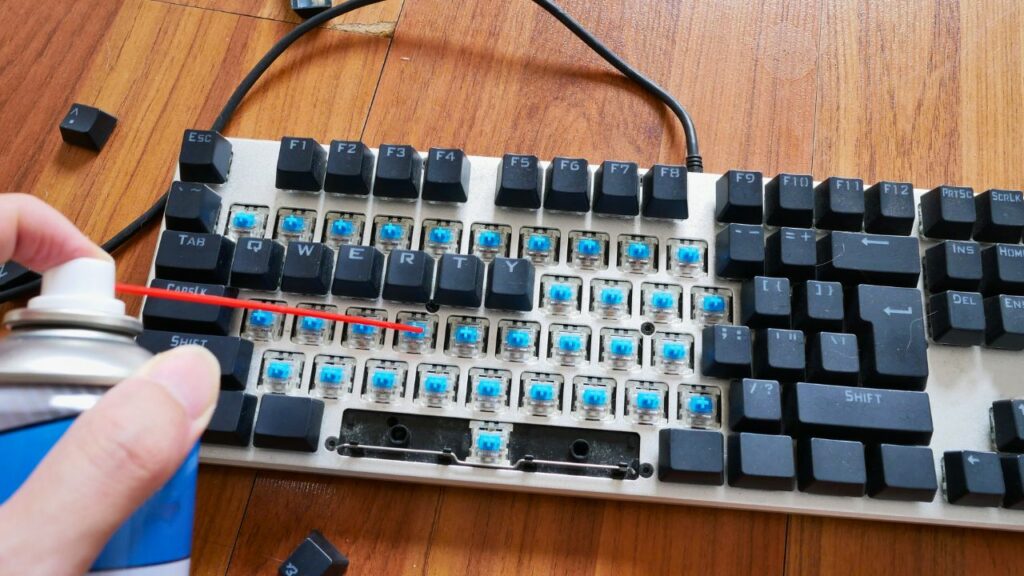
Ever wondered why mechanical keyboards outlast their counterparts? Here’s the lowdown. Their durability stems from the switches they use. In contrast to membrane keyboards that rely on a delicate, flexible surface to register key presses, mechanical keyboards utilize distinct spring-loaded switches. These minuscule powerhouses can withstand up to 50 million keystrokes! And if they show signs of wear and tear? No problem – they’re easily replaceable.
Exploring the Longevity of Mechanical Keyboards: An In-Depth Guide
A question that often pops up among keyboard aficionados and casual users is: what’s the lifespan of mechanical keyboards? Brace yourself for an unexpected answer.
Ten Years of Blissful Typing
Mechanical keyboards are celebrated for their robustness. They have a remarkable lifespan, often touching a decade or even more, all hinging on how much they’re used. The credit largely goes to mechanical switches – the very lifeblood of your keyboard. These switches are designed to withstand an impressive 50 million keystrokes and beyond.
Quality Matters
Mechanical keyboards aren’t all cut from the same cloth. The longevity of your keyboard is closely tied to its quality. It’s common to find that more premium keyboards outlive their budget-friendly counterparts in terms of lifespan. To illustrate, consider the IBM Model M, a classic first rolled out in 1984. Impressively, you can still find several units in working condition, over a quarter-century later!
Parts Most Likely to Give Up First
Despite their robustness, certain parts of your mechanical keyboard are more likely to fail before others. These include switches, keycaps and stabilizers. But don’t fret! Many of these parts can be repaired or replaced as they wear out.
The Price-Quality Correlation
Ever pondered why that top-dollar keyboard seems to outlive its cheaper counterparts? The secret lies in the materials used and how it’s crafted. Premium mechanical keyboards are built tough, employing robust components like hard-wearing metal base plates and high-grade plastic keycaps, designed to endure years of intense gaming.
The Role of Proper Care and Maintenance

Even the most durable mechanical keyboard requires some TLC. Regular cleaning can keep dust and grime from accumulating, which could otherwise hinder your keyboard’s performance over time. If a key starts sticking or feels different when pressed, it may need some maintenance or even replacement.
The Art of Modding
Who said modding is solely for petrolheads? Keyboard buffs too have a blast tweaking their devices for that personalized touch. This might mean swapping out keycaps with premium material alternatives or giving switches a good lube job for that quiet, silky operation. Sure, a dash of technical know-how is needed, but the joy of customizing your keyboard and enhancing its longevity makes it all worthwhile.
Commonly Asked Queries
1. How long do cheap mechanical keyboards last?
Even budget-friendly mechanical keyboards can last several years with proper care and moderate use due to their robust construction.
2. Can I replace parts on my mechanical keyboard?
Absolutely! One of the joys of mechanical keyboards is their customizability. Many components, like switches and keycaps, can be individually replaced, giving you a unique edge and tailored experience.
3. What happens if I spill liquid on my mechanical keyboard?
While certain models boast designs resistant to splashes, a run-in with liquids could still spell trouble, potentially leading to damage or keys going rogue. Accidentally knocked over your coffee on the keyboard? Don’t panic. Simply unplug it right away and wait for it to dry thoroughly before you press those keys again.
4. Are there ways to make my mechanical keyboard quieter?
Absolutely! Lubricating your switches or using O-rings can significantly reduce typing noise.
Maximizing Longevity: Choosing the Right Features

When choosing a mechanical keyboard with longevity in mind, certain features can make a big difference. Look for detachable power cables, splash-resistant designs and aluminium case materials to increase durability. PBT keycaps won’t shine or wear out as quickly as ABS ones and minimalistic lighting lessens the chance of electrical issues.
A Modular Solution to Lifespan Concerns
The modular nature of mechanical switches means they can be easily replaced with hot-swappable keyboards or by de-soldering and soldering new ones; this further extends the life of your keyboard.
Maintenance is Key (No Pun Intended)
With proper maintenance like occasional cleaning and ensuring no liquids near it (accidents happen!), a mechanical keyboard can serve you well for 5-10 years without any major issues.
Noisy Keyboard? Mod It!
Modding not only helps improve the lifespan but also makes them quieter by reducing rattle noise. Lubing switches changes their tone too, making them sound deeper or quieter according to your preference.
The Right Keycaps Make All the Difference
Choosing the right keycaps is paramount for aesthetic reasons but did you know it can indirectly affect lifespan too? Higher quality keycaps will withstand daily use better than cheaper alternatives.
In Case of Accidents…
If you spill water on your keyboard (we’ve all done it), acting fast can save it from permanent water damage or complete failure. That’s why splash-resistant designs are worth considering!
In conclusion, while mechanical keyboards may seem like an investment upfront compared to membrane/chiclet keyboards that are mass produced without longevity in mind – they’re worth every penny in terms of lifespan alone! If you want to learn more about how mechanical keyboard works check out this guide and if you’re on a budget, check out this list of best budget mechanical keyboards!